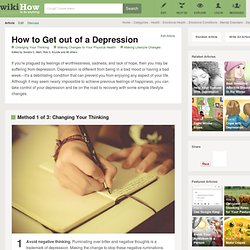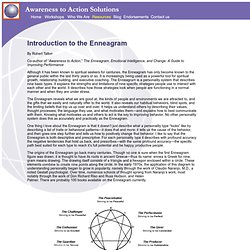

Be Happy. Get out of a Depression. Edit Article Changing Your ThinkingMaking Changes to Your Physical HealthMaking Lifestyle Changes Edited by Sondra C, Alish, Rob S, Krystle and 46 others If you're plagued by feelings of worthlessness, sadness, and lack of hope, then you may be suffering from depression.

Depression is different from being in a bad mood or having a bad week---it's a debilitating condition that can prevent you from enjoying any aspect of your life. 30 Things to Stop Doing to Yourself - StumbleUpon. How to maximise your memory. If you're revising for an exam, learning a new language, or just keen on maximising your memory for everyday life, here are some strategies that might help … Rehearsal The brain is often likened to a muscle, the suggestion being that if you exercise it, its function will improve.

A bodybuilder can strengthen his biceps by repeatedly lifting weights and so, the argument goes, you can improve your memory by repeating over and over to yourself (either out loud or sub-vocally) the information you wish to remember. For years, researchers considered that "rehearsing" information in this way was necessary to retain it in your short-term memory and transfer it into long-term memory. This view fits with our instinct that if we want to remember something like a phone number, we say it to ourselves again and again in the hope that it "sticks". There is evidence that the more an item is rehearsed, the greater the likelihood of long-term retention.
National Accounts of Well-being. Relationship Coaching Tele-Event Bonus Package. 15 Styles of Distorted Thinking. Awareness to Action Solutions. Enneagram workshops for personal and spiritual growth. By Robert Tallon Co-author of “Awareness to Action,” The Enneagram, Emotional Intelligence, and Change: A Guide to Improving Performance Although it has been known to spiritual seekers for centuries, the Enneagram has only become known to the general public within the last thirty years or so.

It is increasingly being used as a powerful tool for spiritual growth, relationship building, and executive coaching. The Enneagram is a personality system that describes nine basic types. It explains the strengths and limitations of nine specific strategies people use to interact with each other and the world. How to Stop Worrying. Undoing the Worrying Habit Once acquired, the habit of worrying seems hard to stop.

We're raised to worry and aren't considered "grown up" until we perfect the art. Teenagers are told: "you'd better start worrying about your future". If your worries aren't at least as frequent as your bowel movements, you're seen as irresponsible, childish, aimless. That's a "responsible adult" game rule. To the extent that worrying is learned/conditioned behaviour, it can be undone. Centuries-old cultural conditioning has given us a nasty neurosis: the belief that happiness must be "earned". Laid on top of the first neurosis is the idea that spending money will make you happy. So: we never stop working, we never stop spending money, we're never really happy – ideal conditions, coincidentally, for a certain type of slave economy.
You won't stop worrying if you think it serves you. The fight-or-flight response (FOF) is useful on rare occasions of real danger. Worrying is never useful. How to Save Yourself from Toxic People: 10 steps (with pictures) The Joy of Quiet. Overcoming Procrastination Instantly Using Self Talk. Changing how we talk to ourselves is the easiest and most powerful way to overcome procrastination.

No other method that I know of disarms procrastination so rapidly and at such a fundamental level: that of our own thoughts. The Voices In Our Heads We’re talking to ourselves all the time inside our minds. Even when you’re not paying attention, these relentless mental debates deeply influence our feelings and, ultimately, our behavior. The good news is that just becoming aware of such mental dialogues — noticing patterns and turning them into productive statements — is usually all you need to overcome many unwelcome feelings and behaviors.
Let’s see how this can help us when it comes to procrastination. The Procrastinator’s Motto Consider the following thought, which for sure has crossed our minds many times in the past: “I have to finish this long, important project. Now, tell me you don’t have this thought sometimes. But what’s so wrong about the Procrastinator’s Motto? 1. 2. 3. 50 Questions That Will Free Your Mind. 30 Things to Stop Doing to Yourself - StumbleUpon. Top 10 Thinking Traps Exposed. Our minds set up many traps for us. Unless we’re aware of them, these traps can seriously hinder our ability to think rationally, leading us to bad reasoning and making stupid decisions. Features of our minds that are meant to help us may, eventually, get us into trouble. Here are the first 5 of the most harmful of these traps and how to avoid each one of them. 1.
The Anchoring Trap: Over-Relying on First Thoughts “Is the population of Turkey greater than 35 million? Lesson: Your starting point can heavily bias your thinking: initial impressions, ideas, estimates or data “anchor” subsequent thoughts. This trap is particularly dangerous as it’s deliberately used in many occasions, such as by experienced salesmen, who will show you a higher-priced item first, “anchoring” that price in your mind, for example. What can you do about it? Always view a problem from different perspectives. 2. Consider the status quo as just another alternative. 3. Be OK with making mistakes. 4. 5.